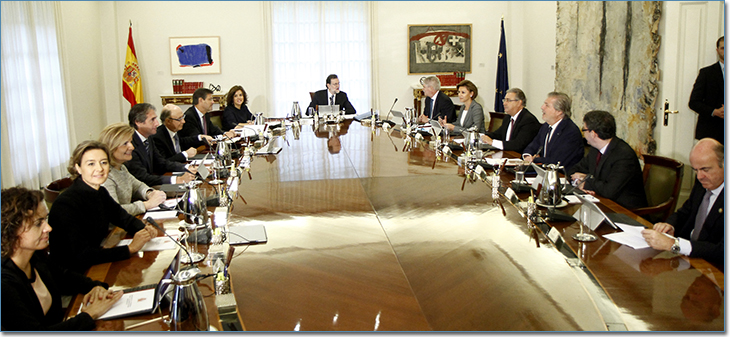Council of Ministers
Government authorises participation by Spanish Armed Forces in overseas missions for 2018
Council of Ministers - 2017.12.22
Moncloa Palace, Madrid
The Government of Spain has authorised an extension to 31 December 2018 for participation by military units and observers on overseas operations. Generally-speaking, not much will change when compared with 2017; although occasional increases have been made whenever Spain has been allocated command or certain goals within a mission, as well as small adjustments to improves security or adapt to an evolving situation on the ground.
All involvement stems from Spain's commitments to the European Union, its NATO allies and the international community represented by the United Nations Security Council. As regards the International Coalition against DAESH, Spain will slightly reorganise and strengthen its contribution by raising the number of personnel by approximately 30 to a total of 480.
Also in terms of defence, the Council of Ministers requested authorisation from the Lower House of Parliament to increase the number of personnel on the European Union training mission in Mali from the current 140 to a maximum of 292.
Foreign language education
Via a Royal Decree, the Government of Spain has adapted foreign language education to the Common European Framework of Reference for Languages.
These regulations set minimum demands at the basic level for the purpose of certification, establish a basic curriculum at levels Intermediate B1, Intermediate B2, Advanced C1 and Advanced C2, and indicate the equivalences between the foreign language education under a special regime regulated by various syllabuses and those of the Royal Decree. The text, which was agreed upon by the regional governments and the education community, also guarantees a response to the needs of pupils with disabilities.
Healthcare research
The Council of Ministers has allocated 115 million euros to the Strategic Action on Healthcare (AES) 2018, in order to increase the competitiveness of R&D+i in the Spanish National Health System and develop the preventive, diagnostic, curative, rehabilitative and palliative aspects of disease.
The subsidies, the duration of which varies between one and five years, are aimed at healthcare research institutes, hospitals and other healthcare centres, universities, and public and private non-profit research centres. The AES 2018 improves the subsidies for research staff and, for the first time, incorporates a specific subsidy for hiring biocomputing experts at healthcare research institutes.
'Connected Schools' programme
The Government of Spain has approved the signing of partnership agreements between the Ministry of Education, Culture and Sport, Red.es and seven regional governments (Aragon, the Balearic Islands, Cantabria, Castile-Leon, Extremadura, Madrid and Region of Valencia) for expanding access to ultra-fast broadband at education centres.
A total of 1.86 million pupils at 5,991 primary and compulsory secondary education centres supported by public funding will benefit from this new measure under the 'Connected Schools' programme, which was first launched in 2015. Over 74 million euros will be invested and funding will come from the Spanish State and the regional governments, with contributions from the European Regional Development Fund (ERDF).
Other agreements
- Construction project tender for a new section of the 'Bergara Junction' on the Basque high-speed railway network.
- 24 Gold Medals for Merit in Fine Arts awarded.
- Regulations on the limitation of atmospheric emissions of certain pollutants coming from medium-sized combustion facilities.
- Approval for the early processing of the contract for the provision of the 016 hotline service offering information and legal advice on gender-based violence.
Application of Article 155 of the Constitution
The Council of Ministers also held an extraordinary meeting to adopt agreements relating to the application of Article 155 of the Spanish Constitution in Catalonia.
The Central Government Representative in Catalonia, Enric Millo, gave a press briefing in Barcelona to explain these decisions. They include amendments to various municipalities, contracting kitchen and cafeteria services at various hospitals in Catalonia, subsidies in the field of the Department of Employment of the Regional Government of Catalonia and the appointment of Professor Joaquim Salvi Mas as Vice-Chancellor of the University of Girona.
Non official translation





